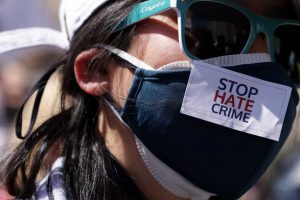Atlanta shootings racially motivated? Crime fits US history of misogyny, hate toward Asian women

After the shootings Tuesday night in the Atlanta area, I woke up the next morning wanting to know the backstory and the names of each of the victims. Delaina Ashley Yaun. Paul Andre Michels. Xiaojie Tan. Daoyou Feng. Soon Chung Park. Hyun Jung Grant. Suncha Kim. Yong Ae Yue. Elcias Hernandez-Ortiz.
Over the course of the past year, we have been inundated with numbers — the number of deaths due to COVID-19, the number of coronavirus infections, the number of victims of racist violence, the number of jobs lost. We must never forget that every number represents a person: a neighbor, a bread winner, a parent, a friend. The eight people taken from us last week, including the six Asian women, had families, dreams, birthdays to celebrate, people they cared for and people who cared for and about them.
The perpetrator targeted Asian businesses and took Asian women’s lives. Whether he believes his actions were racially motivated is irrelevant. The impact of the crime speaks for itself.
A rally in Washington, D.C., to protest hate crimes against Asian American and Pacific Islander communities on March 21, 2021. (Photo: Alex Wong/Getty Images)
Long-standing narratives in our nation that define whose lives have value and whose don’t are deeply rooted in white supremacy and misogyny. These stories paint Asian women specifically as forever foreign and not to be trusted, as objects of desire or servitude, never fully belonging or fully human.
COLUMN: How the deadly Texas storm was a reminder of an inhumane US prison system
These stories are our context, the reason we are targeted by violence in the first place. They determine the rules that define what is acceptable and what is not. Narratives take lives, they shape our economic realities, our health and our safety. They allow for the work and contributions of Asian and other women of color to be perpetually devalued. When we accept that women of color are less valuable or more disposable, we also accept violence against them.
As a Chinese American woman who has organized domestic workers for more than 20 years, I have witnessed firsthand the precariousness of work for Asian American and Pacific Islander women and other women of color. The conditions of domestic work in the United States are rooted in misogyny and white supremacy. Among the first domestic workers were enslaved Black women, with Indigenous, Latinx and AAPI women, along with many generations of immigrants, joining their ranks. The work is some of the most important and fastest growing work in our economy, and yet it’s still undervalued, unprotected and treated as less than real work. Domestic workers struggle to survive on poverty wages, to stay safe and healthy without protections and face all forms of abuse, unseen by society. The workplace conditions for this workforce — nearly 2.5 million women, mostly women of color — exist not by happenstance but by design.
COLUMN: Infectious disease expert, former attorney general: Prioritize COVID vaccines for inmates
Last week’s killing spree is just the most recent tragedy amidst a dramatic rise in reported cases of anti-Asian racism, in particular targeting Asian women. In major cities across the country, anti-Asian hate crimes have spiked by 150% in 2020, emboldened by a former president’s insistence on calling the coronavirus the “Chinese virus” and “kung flu.”
This is also in the context of a public health and economic crises in which female AAPI workers endured devastating conditions and impossible choices. Many AAPI home care employees worked through the dangers of the pandemic, providing an essential lifeline to so many of our elders, earning poverty wages, without health care or paid time off.
Some of them died of COVID-19 exposure. The logic that makes it acceptable to attack an older AAPI woman is the same logic that allows us to keep AAPI women in unsafe jobs, living in poverty, without a safety net. All of this while the hierarchy of power — one that relies upon a hierarchical narrative of human value with white men at the top and dehumanizes each racial and ethnic group of women differently — remains in place.
These narratives have on one hand made us targets and on the other hand made us invisible. But they will not define us.
POLICING THE USA: A look at race, justice, media
AAPI women have always worked to strengthen our communities, build our power and ensure our voices are heard. Female Asian leaders and organizations, such as Stephanie Cho of Asian Americans Advancing Justice-Atlanta, Aquilina Soriano of the Pilipino Workers Center, which organizes Filipina care workers, and Sung Yeon Choimorrow of the National Asian Pacific American Women’s Forum are bringing our community together to grieve, heal and support the families who are now mourning the loss of their loved ones.
As we grieve the loss of Yaun, Michels, Tan, Feng, Park, Grant, Kim and Yue, may we also lift up the leadership of the Asian women who continue to work to address racial and gender-based violence and injustice in our communities. And may this moment galvanize us all to say: Enough!
This could be another moment, or it could be the start of a movement.
A nation where Asian women (along with Black, Latinx and Indigenious women) are safe and valued in their homes, at work and on the streets, is only possible if we commit to building it.
Ai-jen Poo is a MacArthur “genius award” winner and the director of the National Domestic Workers Alliance. Follow her on Twitter: @aijenpoo
You can read diverse opinions from our Board of Contributors and other writers on the Opinion front page, on Twitter @usatodayopinion and in our daily Opinion newsletter. To respond to a column, submit a comment to [email protected].
Source: Read Full Article

